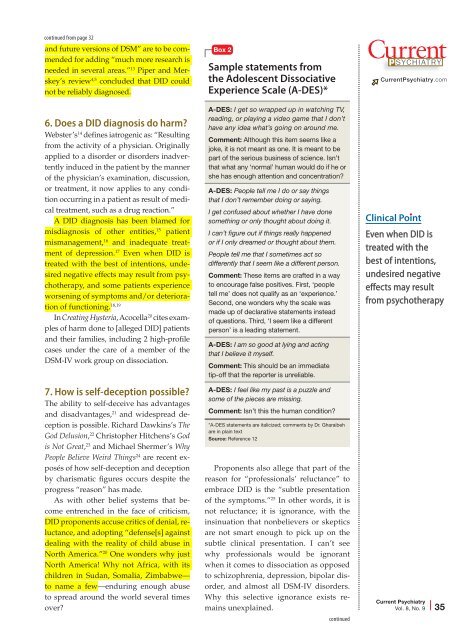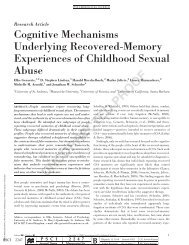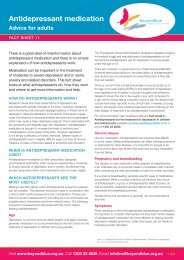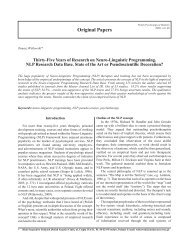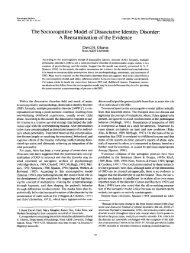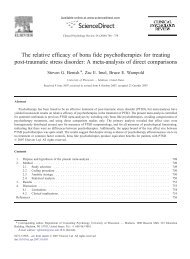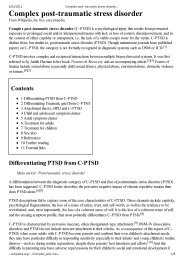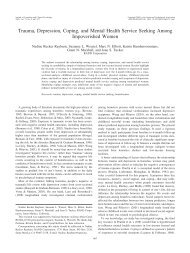Dissociative identity disorder: Time to remove it from DSM-V ...
Dissociative identity disorder: Time to remove it from DSM-V ...
Dissociative identity disorder: Time to remove it from DSM-V ...
You also want an ePaper? Increase the reach of your titles
YUMPU automatically turns print PDFs into web optimized ePapers that Google loves.
continued <strong>from</strong> page 32<br />
and future versions of <strong>DSM</strong>” are <strong>to</strong> be commended<br />
for adding “much more research is<br />
needed in several areas.” 13 Piper and Merskey’s<br />
review 4,5 concluded that DID could<br />
not be reliably diagnosed.<br />
6. Does a DID diagnosis do harm?<br />
Webster’s 14 defines iatrogenic as: “Resulting<br />
<strong>from</strong> the activ<strong>it</strong>y of a physician. Originally<br />
applied <strong>to</strong> a <strong>disorder</strong> or <strong>disorder</strong>s inadvertently<br />
induced in the patient by the manner<br />
of the physician’s examination, discussion,<br />
or treatment, <strong>it</strong> now applies <strong>to</strong> any cond<strong>it</strong>ion<br />
occurring in a patient as result of medical<br />
treatment, such as a drug reaction.”<br />
A DID diagnosis has been blamed for<br />
misdiagnosis of other ent<strong>it</strong>ies, 15 patient<br />
mismanagement, 16 and inadequate treatment<br />
of depression. 17 Even when DID is<br />
treated w<strong>it</strong>h the best of intentions, undesired<br />
negative effects may result <strong>from</strong> psychotherapy,<br />
and some patients experience<br />
worsening of symp<strong>to</strong>ms and/or deterioration<br />
of functioning. 18,19<br />
In Creating Hysteria, Acocella 20 c<strong>it</strong>es examples<br />
of harm done <strong>to</strong> [alleged DID] patients<br />
and their families, including 2 high-profile<br />
cases under the care of a member of the<br />
<strong>DSM</strong>-IV work group on dissociation.<br />
7. How is self-deception possible?<br />
The abil<strong>it</strong>y <strong>to</strong> self-deceive has advantages<br />
and disadvantages, 21 and widespread deception<br />
is possible. Richard Dawkins’s The<br />
God Delusion, 22 Chris<strong>to</strong>pher H<strong>it</strong>chens’s God<br />
is Not Great, 23 and Michael Shermer’s Why<br />
People Believe Weird Things 24 are recent exposés<br />
of how self-deception and deception<br />
by charismatic figures occurs desp<strong>it</strong>e the<br />
progress “reason” has made.<br />
As w<strong>it</strong>h other belief systems that become<br />
entrenched in the face of cr<strong>it</strong>icism,<br />
DID proponents accuse cr<strong>it</strong>ics of denial, reluctance,<br />
and adopting “defense[s] against<br />
dealing w<strong>it</strong>h the real<strong>it</strong>y of child abuse in<br />
North America.” 20 One wonders why just<br />
North America! Why not Africa, w<strong>it</strong>h <strong>it</strong>s<br />
children in Sudan, Somalia, Zimbabwe—<br />
<strong>to</strong> name a few—enduring enough abuse<br />
<strong>to</strong> spread around the world several times<br />
over?<br />
Box 2<br />
Sample statements <strong>from</strong><br />
the Adolescent <strong>Dissociative</strong><br />
Experience Scale (A-DES)*<br />
A-DES: I get so wrapped up in watching TV,<br />
reading, or playing a video game that I don’t<br />
have any idea what’s going on around me.<br />
Comment: Although this <strong>it</strong>em seems like a<br />
joke, <strong>it</strong> is not meant as one. It is meant <strong>to</strong> be<br />
part of the serious business of science. Isn’t<br />
that what any ‘normal’ human would do if he or<br />
she has enough attention and concentration?<br />
A-DES: People tell me I do or say things<br />
that I don’t remember doing or saying.<br />
I get confused about whether I have done<br />
something or only thought about doing <strong>it</strong>.<br />
I can’t figure out if things really happened<br />
or if I only dreamed or thought about them.<br />
People tell me that I sometimes act so<br />
differently that I seem like a different person.<br />
Comment: These <strong>it</strong>ems are crafted in a way<br />
<strong>to</strong> encourage false pos<strong>it</strong>ives. First, ‘people<br />
tell me’ does not qualify as an ‘experience.’<br />
Second, one wonders why the scale was<br />
made up of declarative statements instead<br />
of questions. Third, ‘I seem like a different<br />
person’ is a leading statement.<br />
A-DES: I am so good at lying and acting<br />
that I believe <strong>it</strong> myself.<br />
Comment: This should be an immediate<br />
tip-off that the reporter is unreliable.<br />
A-DES: I feel like my past is a puzzle and<br />
some of the pieces are missing.<br />
Comment: Isn’t this the human cond<strong>it</strong>ion?<br />
*A-DES statements are <strong>it</strong>alicized; comments by Dr. Gharaibeh<br />
are in plain text<br />
Source: Reference 12<br />
Proponents also allege that part of the<br />
reason for “professionals’ reluctance” <strong>to</strong><br />
embrace DID is the “subtle presentation<br />
of the symp<strong>to</strong>ms.” 25 In other words, <strong>it</strong> is<br />
not reluctance; <strong>it</strong> is ignorance, w<strong>it</strong>h the<br />
insinuation that nonbelievers or skeptics<br />
are not smart enough <strong>to</strong> pick up on the<br />
subtle clinical presentation. I can’t see<br />
why professionals would be ignorant<br />
when <strong>it</strong> comes <strong>to</strong> dissociation as opposed<br />
<strong>to</strong> schizophrenia, depression, bipolar <strong>disorder</strong>,<br />
and almost all <strong>DSM</strong>-IV <strong>disorder</strong>s.<br />
Why this selective ignorance exists remains<br />
unexplained.<br />
continued<br />
Clinical Point<br />
Even when DID is<br />
treated w<strong>it</strong>h the<br />
best of intentions,<br />
undesired negative<br />
effects may result<br />
<strong>from</strong> psychotherapy<br />
Current Psychiatry<br />
Vol. 8, No. 9 35


